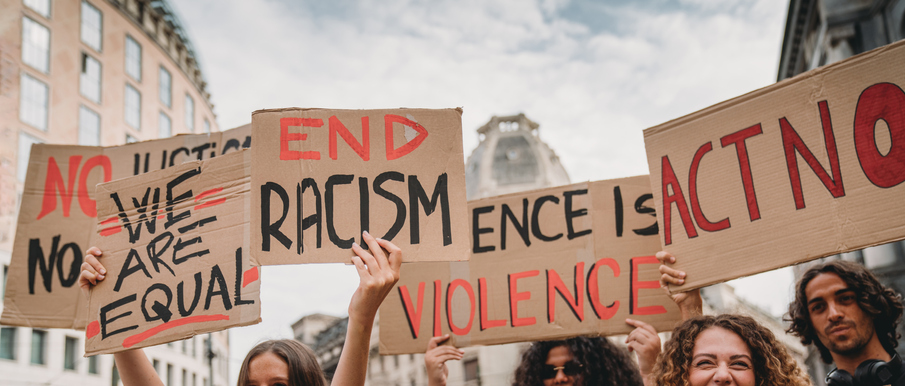This is a story about love
But it’s not about that Valentine’s Day love
Or that motherly love
It ain’t even about that Philly brotherly love
No
This is a story about the love that hate produced
It’s a story about Africa and all of her children
Still loving themselves
After centuries of systemic injustice

Thus begins “Lies About Black People” by Omekongo Dibinga, Ph.D.. The book takes a hard look at race relations from the perspective of a child of Congolese immigrants who has established a career in academia and made a name for himself as a musician, rapper, podcaster and poet.
The book’s subtitle underscores its message — “How To Combat Racism and Why It Matters.” The book explores and debunks myths (OK, lies) about non-Black people’s perceptions of Blacks. In short chapters, many containing his poems, Dabinga punctures myths about Blacks with research, stories and humor. The book aims to make it safe to discuss issues in ways that illuminate them to create a more profound understanding.
Understanding the issues
“The categories of race that we know them as today were created in the mid-1400s in order to justify enslavement and to justify black oppression,” Dabinga told me in a recent interview. “And that idea that black people are inferior has been at the heart of so many issues that black people still face today.” This sense of inferiority that many Blacks felt in the era of Jim Crow remains unrecognized by majority cultures. Yet this erosion of self-esteem that occurred generations ago lies at the heart of many problems that plague our society today.
“It’s not enough to just say, ‘I’m not racist,’ ‘Well, I didn’t own slaves; my grandfather didn’t own slaves’ or whatever. If you don’t actively fight it, you are part of the problem,” says Dibinga. One could draw an analogy to watching someone being assaulted and not calling for help. “If you see racism happening in your job towards somebody, and you don’t say anything because you are not racist, then you’re condoning racism.”
Finding solutions
The responsibility of leaders is to find solutions. Become an UPstander — the opposite of a bystander. Dibinga offers a call to action in the form of an acronym: LEAD.
Learn. Stage opportunities for individuals to have conversations about race. Listen to their stories. Share your own.
Educate. Read works by authors of the Black experience like Ibrahim Kendi, Michelle Alexander, Ta’nehisi Coates and poet Amanda Gorman. Create a book club for those who want to discuss these works. Also, become informed. Stay abreast of the issues that marginalize minorities.
Advocate. Resolve as leaders to do what you can do. Sponsor community efforts that support the children and families lacking in financial resources for sports, arts and education. Provide paid time off for employees who want to volunteer.
Decide. Become — as Dibinga writes — a partner, one with a shared interest in working for equality. Make certain that inclusion is fundamental to how your organization functions. Solicit participation from the entire organization. Practice the principles of psychological safety — make it safe for people to voice their ideas and advocate for themselves.
Making the right choice
Dealing with racial inequity is a matter of principle, yes, but it also rubs up against our own biases. Each of us has hidden biases that prevent us from seeing issues from another individual’s point of view. Yet, as in Plato’s myth of the cave, once we see beyond our biases, we find illumination. Our challenge is understanding what has held us back and how we can go further, not alone but by embracing lessons from different cultures. We are all works in progress.
Dibinga is fond of saying, “LEAD stands for Learn Everything and Do! If you learn everything and don’t, then you are not a leader. You simply possess knowledge, but knowledge is not power. The application of knowledge is where real power comes into play,” writes Dibinga. Leaders who care can help their teams discover the issues, determine what is possible and become involved in ways that will help their community.
“The story of Black people in this country has been the story of grace under pressure,” says Dibinga. “We fought in every war. We’ve committed to every single [freedom] movement. We are out there standing in lockstep. So the story of Black people in this country has been a story about grace.”
Near the end of the book, Dinbinga closes with this poem, from which I quote the opening.
If I want to change the world, I have to change myself
For a change in the mind is true wealth, it’s true health
My environment will never change until I change me
Rearrange me, my thinking can never be the same, see
Gandhi went from lawyer to leader, changed his mind
King, from preacher to Nobel Peace Prize, changed his mind
In fine time, align your mind and align the world
Note: Here’s a link to the full LinkedIn Live interview with Dibinga.
John Baldoni is a member of 100 coaches and a leadership keynote presenter. He has been recognized as a top 20 leadership expert by Global Gurus, a list he has been on since 2007. He is also ranked as a Global 100 Leader and Top 50 Leadership Expert by Inc.com. John is the author of 15 books. His leadership resource website is www.JohnBaldoni.com
Opinions expressed by SmartBrief contributors are their own.
_______________________________
Subscribe to SmartBrief’s FREE email newsletter on leadership. It’s among SmartBrief’s more than 250 industry-focused newsletters.
